Institute leads and affiliates
Dr. Suzanne Stewart | Director
Dr. Stewart is a member of the Yellowknives Dene First Nation.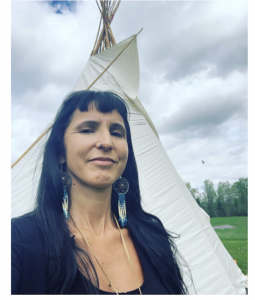
She is a registered psychologist and Director of the Waakebiness-Bryce Institute for Indigenous Health at the Dalla Lana School of Public Health at the University of Toronto (U of T), where she is a Professor in the Division of Social and Behaviour Health Sciences. She holds the TC Energy Research Chair in Indigenous Health. Research and teaching interests include Indigenous health and healing in psychology (homelessness, youth mental health, identity, and work-life development), Indigenous determinants of health, Indigenous pedagogies in higher education and health sciences, and Indigenous research ethics and methodologies. She is committed to advancing Indigenous healing issues in academics, health practice, and policy.
Dr. Angela Mashford-Pringle | Associate Director
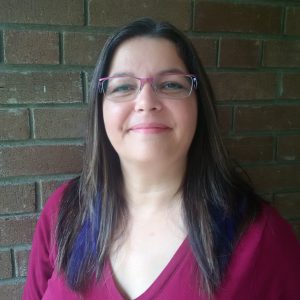 Dr. Angela Mashford-Pringle is an urban Algonquin woman from Timiskaming First Nation in northern Quebec whose research is at the intersection of Indigenous health and education. She completed her PhD at the Dalla Lana School of Public Health, University of Toronto. Angela was a post-doctoral fellow in the ACHIEVE program at St. Michael’s Hospital working with the Well Living House, worked for many years at Health Canada and the Public Health Agency of Canada managing a variety of Aboriginal social programs like Aboriginal Head Start Urban and Northern Communities and the Community Action Program for Children. In 2010/11, Angela worked as the inaugural Aboriginal Programs Manager at Centennial College where she developed Aboriginal Business Diploma and the frameworks for programs in early learning, health management, music, film, and an Aboriginal Studies Diploma. Angela has been a lecturer at Indigenous Studies, University of Toronto, and is a part-time faculty member at Sheridan College in the Faculty of Applied Health and Community Development.
Dr. Angela Mashford-Pringle is an urban Algonquin woman from Timiskaming First Nation in northern Quebec whose research is at the intersection of Indigenous health and education. She completed her PhD at the Dalla Lana School of Public Health, University of Toronto. Angela was a post-doctoral fellow in the ACHIEVE program at St. Michael’s Hospital working with the Well Living House, worked for many years at Health Canada and the Public Health Agency of Canada managing a variety of Aboriginal social programs like Aboriginal Head Start Urban and Northern Communities and the Community Action Program for Children. In 2010/11, Angela worked as the inaugural Aboriginal Programs Manager at Centennial College where she developed Aboriginal Business Diploma and the frameworks for programs in early learning, health management, music, film, and an Aboriginal Studies Diploma. Angela has been a lecturer at Indigenous Studies, University of Toronto, and is a part-time faculty member at Sheridan College in the Faculty of Applied Health and Community Development.
John Wabegijik | Administrative Coordinator
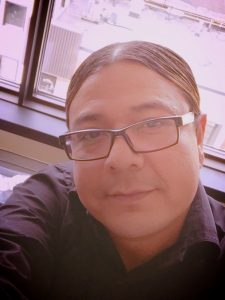 John Wabegijik is Ojibway and a proud member of Sheshegwaning First Nation located on Manitoulin Island. John has lived and worked in Toronto for several years. John’s past work experience includes working in administration for Na-Me-Res (Native Men’s Residence). John recently obtained his BA Degree in Public Administration and Governance through Ryerson University in partnership with FNTI (First Nations Technical Institute). John is very excited to be part of Waakebiness Institute for Indigenous Health team and looking forward to assisting in the many positive projects.
John Wabegijik is Ojibway and a proud member of Sheshegwaning First Nation located on Manitoulin Island. John has lived and worked in Toronto for several years. John’s past work experience includes working in administration for Na-Me-Res (Native Men’s Residence). John recently obtained his BA Degree in Public Administration and Governance through Ryerson University in partnership with FNTI (First Nations Technical Institute). John is very excited to be part of Waakebiness Institute for Indigenous Health team and looking forward to assisting in the many positive projects.
Dr. Billie-Jo Hardy | Associate Director & Professor

Dr. Billie-Jo Hardy, currently an Associate Director for WIIH, is an Assistant Professor at the Dalla Lana School of Public Health and an Affiliate Scientist at the Well Living House at the Li Ka Shing Knowledge Institute. She is working with the Waakebiness research team to develop an Indigenous health research program on neurological health and wellness. She is also co-leading, in partnership with Indigenous organizations and communities, the development of a biological health research training program that incorporates Indigenous and Western knowledges that will strengthen capacities and create opportunities for interested First Nation communities to lead biological health research. Her research interests include Indigenous and global public health research and implementation, innovation sciences, health equity and research ethics. Dr. Hardy spent several years at the Well Living House where she led research programs on evaluating Indigenous cultural safety training programs and reviewing policy and practice in Indigenous health research. Dr. Hardy began her career as a research fellow at the Sandra Roman Centre for Global Health Research, specializing in research ethics, global health and innovation sciences. She has advised global health agencies and foundations, including the Bill & Melinda Gates Foundation, PATH and Grand Challenges Canada.
Clayton Shirt | Elder in Residence
Clayton is a traditional knowledge practitioner of holistic health and wellness, lecturer, educator and historian. 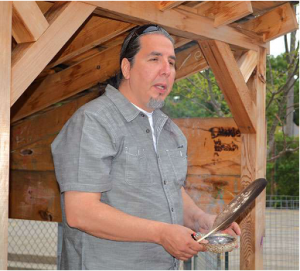 His worldview and understanding of life is based on living his whole life immersed in learning from his traditional Indigenous teachers, elders and family. He is currently the sitting traditional knowledge teacher/educator with WBIIH where he is able to bring his traditional perspective and vast experience in ‘walking the good path’ to scholars and educators. Also being able to bring wise counsel and support to indigenous students seeking higher learning. He was raised and currently lives in Toronto, with his wife and family of three children and his beautiful granddaughter.
His worldview and understanding of life is based on living his whole life immersed in learning from his traditional Indigenous teachers, elders and family. He is currently the sitting traditional knowledge teacher/educator with WBIIH where he is able to bring his traditional perspective and vast experience in ‘walking the good path’ to scholars and educators. Also being able to bring wise counsel and support to indigenous students seeking higher learning. He was raised and currently lives in Toronto, with his wife and family of three children and his beautiful granddaughter.
Michael Brown | WIIH Research Officer and Cultural and Spiritual Events Coordinator
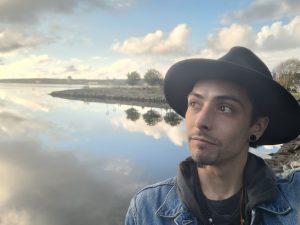
Michael Brown is of Stolo Nation, Irish, Métis and Icelandic ancestry, having been raised in the western culture, now decolonizing himself through Spirit and ceremony. He has achieved an honour’s undergraduate degree in Psychology at York University and a Master of Education degree at OISE. He is currently working on his PhD in Social and Behavioural Health Sciences at U of T for the improvement of mental health of Indigenous youth. As a research officer and cultural and spiritual events coordinator for Waakebiness Institute for Indigenous Health, he works with community and Elders to improve (Indigenize) academia.
Donna Hill | Administrative Assistant
 Donna is half Upper Mohawk and half British settler, originally from Brantford and Six Nations, and brings over 18 years of administrative experience with Infant and Early Mental Health Promotion at The Hospital for Sick Children to her role. Her focus has been on supporting the provision of high-quality learning experiences for cross disciplinary professionals, to enhance mental health services across the lifespan.
Donna is half Upper Mohawk and half British settler, originally from Brantford and Six Nations, and brings over 18 years of administrative experience with Infant and Early Mental Health Promotion at The Hospital for Sick Children to her role. Her focus has been on supporting the provision of high-quality learning experiences for cross disciplinary professionals, to enhance mental health services across the lifespan.
Contact Us
Phone: (416) 978 8502
Email: wbiih.dlsph@utoronto.ca
